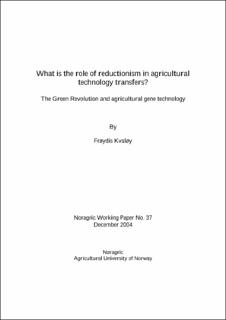| dc.contributor.author | Kvaløy, Frøydis | |
| dc.date.accessioned | 2020-09-30T12:26:32Z | |
| dc.date.available | 2020-09-30T12:26:32Z | |
| dc.date.issued | 2004-12 | |
| dc.identifier.issn | 0809-4934 | |
| dc.identifier.uri | https://hdl.handle.net/11250/2680544 | |
| dc.description.abstract | This paper gives special attention to the questions of how and to what extent agricultural technology introductions particularly in the South have been informed by reductionist ways of thinking. The reductionist approach has dominated scientific investigation from as far back as the early seventeenth century. It has been incredibly successful when attempting to analyse and explain natural phenomena and processes. It may however be a different matter when reductionism constitutes the basis for technology applications in various contexts. Could the reductionist influence be the explanation when technology introductions bring about unexpected or problematic consequences in the field or in rural people's livelihood situation? The issue is discussed with reference to the Green Revolution and agricultural gene technology. In the case of the Green Revolution environmental and socio-economic consequences are addressed. In the case of gene technology the paper focuses specifically on introduction of Bt cotton and Golden rice. | en_US |
| dc.language.iso | eng | en_US |
| dc.publisher | Norwegian University of Life Sciences, Ås | en_US |
| dc.relation.ispartofseries | Noragric Working Paper;37 | |
| dc.title | What is the role of reductionism in agricultural technology transfers? The Green Revolution and agricultural gene technology | en_US |
| dc.type | Working paper | en_US |
| dc.subject.nsi | VDP::Agriculture and fishery disciplines: 900::Agriculture disciplines: 910::Agricultural technology: 916 | en_US |
| dc.source.pagenumber | 32 | en_US |
